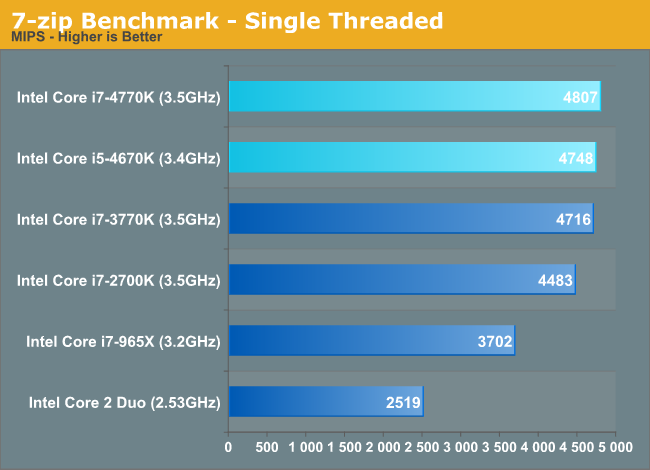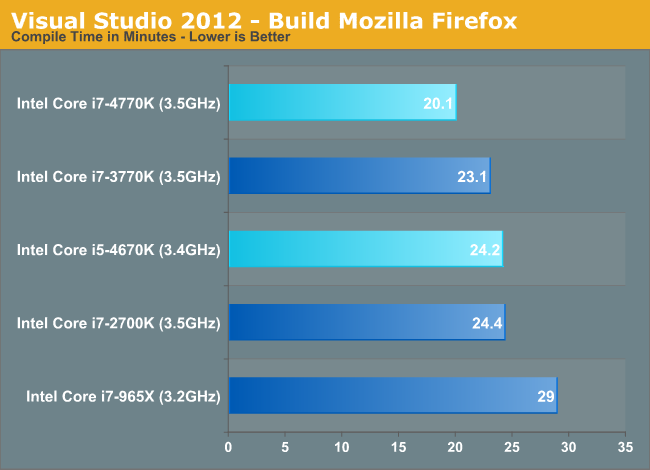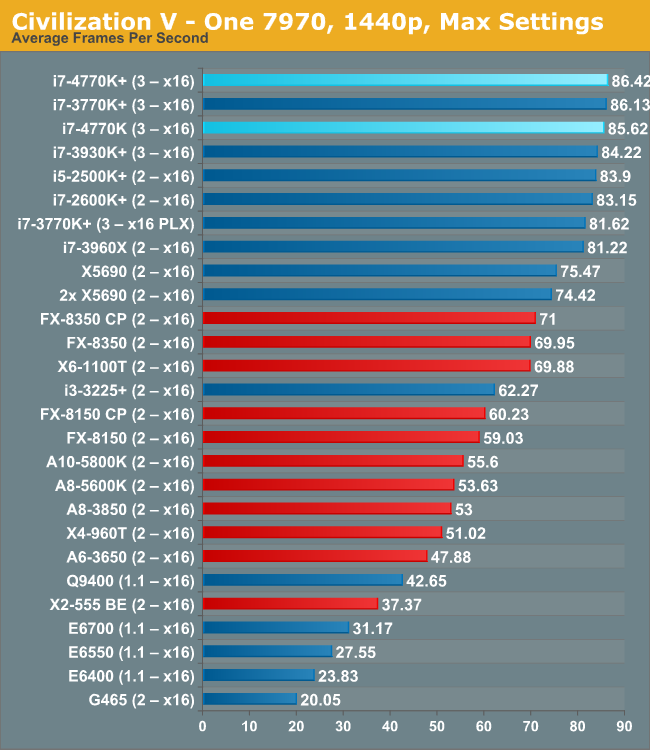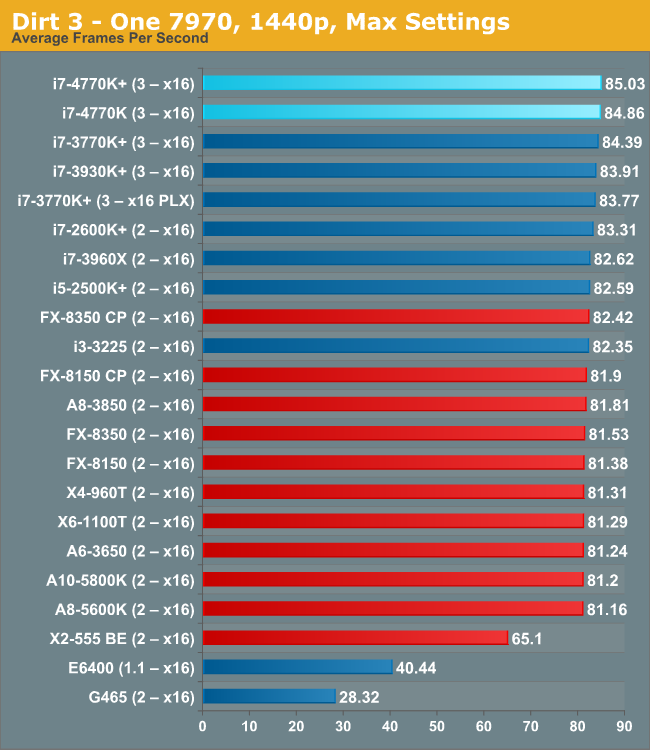The Haswell Review: Intel Core i7-4770K & i5-4670K Tested
by Anand Lal Shimpi on June 1, 2013 10:00 AM ESTCPU Performance: Five Generations of Intel CPUs Compared
For the purposes of our look at Haswell, we will be breaking up our review coverage into two parts. The rest of this article will focus on the CPU side of Haswell, while coverage of the GPU - including Iris Pro and Crystalwell - has been spun off into another artice: Intel Iris Pro 5200 Graphics Review: Core i7-4950HQ Tested.
The majority of the market doesn’t upgrade annually, so I went back a total of five generations to characterize Haswell’s CPU performance. Everything from a 2.53GHz Core 2 Duo through Nehalem, Sandy Bridge, Ivy Bridge and Haswell are represented here. With the exception of the Core 2 platform, everything else is running at or near the peak launch frequency for the chip.
In general, I saw performance gains over Ivy Bridge of 1 - 19%, with an average improvement of 8.3%. Some of the performance gains were actually quite impressive. The 7.8% increase in Kraken shows there’s still room for improvement in lightly threaded performance, while the double digit FP performance gains in POV-Ray and x264 HD really play to Haswell’s strengths.
Compared to Sandy Bridge, Haswell looks even more impressive. The Core i7-4770K outperforms the i7-2700K by 7 - 26%, with an average performance advantage of 17%. The gains over Sandy Bridge aren’t large enough to make upgrading from a Sandy Bridge i7 to a Haswell i5 worthwhile though, as you still give up a lot if you go from 8 to 4 threads on a quad-core part running heavily threaded workloads.
Compared to Nehalem the gains average almost 44%.











Quite possibly the most surprising was just how consistent (and large) the performance improvements were in our Visual Studio 2012 compile test. With a 15% increase in performance vs. Ivy Bridge at the same frequencies, what we’re looking at here is the perfect example of Haswell’s IPC increases manifesting in a real-world benchmark.
Gaming Performance
After spending far too much time on the Iris Pro test system, I didn’t have a ton of time left over to do a lot of gaming performance testing with Haswell. Luckily Ian had his gaming performance test data already in the engine, so I borrowed a couple of graphs.
As expected, Haswell is incrementally quicker in GPU bound gaming scenarios compared to Ivy Bridge - and most definitely at the top of the charts.












210 Comments
View All Comments
chizow - Saturday, June 1, 2013 - link
Nice review Anand, it's pretty much what I expected from Haswell. 5-15% over IVB with all the bells and whistles of Lynx Point Z87 (6xSATA6G, more USB 3.0 etc.) This will make a nice upgrade for me coming from an OC'd i7-920 and X58 platform, now to see what deals MicroCenter has on the 4770K.I would have liked to have seen normalized clockspeed comparisons in the 5-gen Intel round-up but understand this does not reflect real-world results, given SB and above have much better turbo boost and base clocks. I think it would've given a better idea of IPC however, for those who have been overclocking their older platforms to similar max OC levels.
I also would have liked to have seen more gaming and OC'ing tests but understand this first review needed to cover most of the bases for a general audience, look forward to more testing in the future along with some looks at the Z87 chipset nuances.
Concillian - Saturday, June 1, 2013 - link
So what I'm seeing is 4770 compared with 3770... ~13% more power at load for Hasswell, but less than 10% more performance in the benchmarks? Is that correct?A5 - Saturday, June 1, 2013 - link
Anand's numbers put it at 13% faster with an 11% power increase. Not sure how you did the math.Concillian - Saturday, June 1, 2013 - link
You're right in that particular test. +12% power for +13% performance. Still disappointing. Most of the other benchmarks are showing less than 10% improvement, but we don't know the power story. Overall disappointing. With all the talk about power efficiency, I was hoping for +5-10% performance at the same or lower power consumption. All the power benefits seem to be at idle.gipper51 - Saturday, June 1, 2013 - link
I'm glad I went ahead and built my 3770 system a few months ago instead of holding out for Haswell. Nothing about Haswell was worth waiting for (for my needs). Damn...based on this and Intel's roadmaps I may be on IVB for a looooong time.LordSegan - Saturday, June 1, 2013 - link
Very weak new chip. Minimal increase in performance unless you are running a render farm or using a crappy ultra book. Useless for desktop gamers.vlvh - Saturday, June 1, 2013 - link
I'm just wondering what the rationalisation for using a Core 2 Duo for comparison benching is? Surely a Core 2 Quad (eg Q6600) would be a more accurate representation seeing as all the other parts in the benchmark are quad core.WhoBeDaPlaya - Saturday, June 1, 2013 - link
You'd think Anand would have covered something as important as this.I did not see this in _any_ of the reviews.
Also, the wording on the BCLK overclocking is a little odd. So bottom line - can we OC the 4770 using BCLK or not?
Kevin G - Monday, June 3, 2013 - link
The actual BLCK changes will be pretty much inline with what you'd be able to do on Z68 or Z77, about 110 Mhz max.Socket 1150 and Z87 add another bus multiplier to feed the CPU like socket 2011 parts have. So you can have a 100 Mhz clock feeding the PCI-E controller with a 1.25x multiplier a 125 Mhz clock will feed the CPU cores before the CPU multiplier. Increasing the BCLK to 108 Mhz and a 1.25 bus multiplier would equate to a 135 Mhz clock before the CPU multiplier is applied.
jmcb - Saturday, June 1, 2013 - link
All this means is when I finally get my first quad core PC, a 3770k will be cheaper. I see no reason to get this over that.